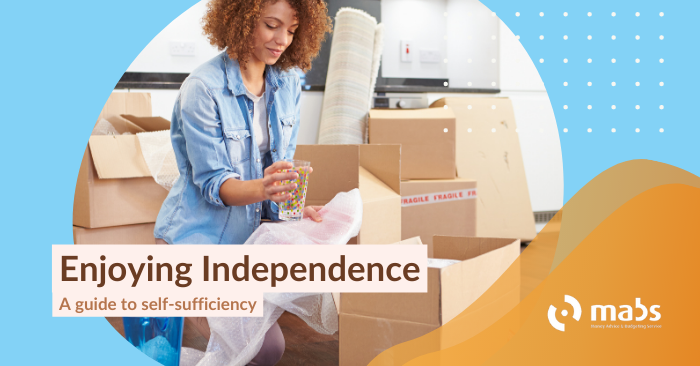Enjoying Independence – A guide to self-sufficiency

Enjoying Independence and Budgeting
Do you live on your own? Perhaps you share a house with friends? Or maybe you’re moving out to start an independent life. Many people live alone, even if they don’t live alone in a one-bedroom apartment. When discussing budgeting and household finances, we often talk about the family budget. This usually includes children’s costs as well. You might think, “Well, that doesn’t apply to me”, and struggle to work out your budget. We’re here to help you start your budgeting plan and enjoy independence.
Where to start
Independence covers many different stages of life, from just moving out of your parents’ house, house sharing or living alone your entire life. It comes with different or sometimes more financial responsibilities as you don’t have someone to share the burden with. Additionally, being upfront and straight regarding house sharing would be best.
As if you are moving into a new place and sharing with others, the first step can be establishing your guidelines. For example, a household budget, chore roster and how to set yourself up for success. Reducing the stress of living on your own comes from planning. Through planning, we can begin to enjoy independence.
-
Get Organised
The key to success is planning and organising. If you’ve been living on your own for a while, you’ll have bills and an idea of how you run your home. However, it will be completely new if you’re moving out on your own for the first time. We recommend starting with organising. This will set you on the path to success.
-
Start a budget
Starting your budget can be as simple as grabbing a pen and paper or opening an Excel spreadsheet. Tracking your income – your pay, social welfare payments (any) and any other revenue. Now do the same with your outgoings; list them out. Do you have money left over at the end of the month, or are you overstretching? Keep track of your spending for a week. Use our spending diary to keep track if you’re having trouble making sense of where your money is going. You can revisit your budget and our spending diary as often as you’d like. With the increased cost of living, it isn’t easy to imagine having some discretionary funds. However, planning and saving small savings can allow you to engage in small room improvement projects. This will enable you to enjoy independence.
Top Tip – when setting out your budget, note when and what dates your payments go out on a calendar (physical or digital) so that you can be aware and keep money in your account so bills don’t bounce. -
Household Timetable
Now that your finances are on track (or at least you’re on your way), it’s time to tackle your home. Ever heard the phrase “tidy house, tidy mind”? Although it might not work for everyone, there’s some truth to it, the less stress and clutter you have, the less it takes up in your mind. Everyone has different ways of getting their chores done; some prefer to leave it all on their days off, and others try to do a little every day. Find out what works for you, and if you have housemates, sit down and work out a household timetable. Likewise, if you’re sharing, a timetable for shared spaces like the kitchen or if there will be shared meals (along with the budgets for same).
-
Unexpected costs
Whether you’re moving out on your own for the first time or just getting organised, there will almost always be unexpected costs. If you own your home, it could be things like a washing machine breaking – if you’re renting, and your washing machine breaks, you’ll have to pay to wash your clothes at a laundrette or similar while your landlord sorts a new one – having an emergency fund is important for these things.
-
Switch to save
Whether it’s keeping an eye on your local supermarkets for the best deals or switching your utilities, broadband or bank, these are all ways to save and boost that emergency fund.
Moving out and living on your own is a big step. Many stresses come along with living by yourself, such as budgeting and organising. However, through our top tips for enjoying independence, you can begin to embrace the excitement.
Next Steps
For more information and support, check out these useful links below!
- Beginning a Tenancy
- Tenant’s Rights and Responsibilities – Residential Tenancies Board
- Renting a Home – Citizens Information
- Homeowners – Citizens Information
If you have a query on digital banks or general money, budgeting or debt-related question, you can call the MABS National Helpline on 0818 07 2000, Monday to Friday, from 9 am to 8 pm or find the contact details for your local office.
Don’t forget to follow us too at @MABSinfo – Facebook, Instagram, or Twitter.
Disclaimer: While every effort is made to make sure this information is accurate and correct, we strongly recommend that you do your research and make your own informed decision.
Note: We welcome references to and use of the content in this blog. However, please reference MABS and link said content if you choose to do so.




Facebook
twitter
Instagram